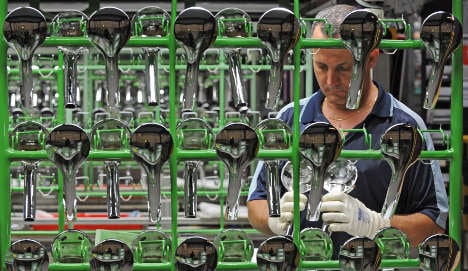Following a sharp slowdown during a particularly difficult winter, the economy will pick up again at a much more sustained rhythm, the Bundesbank said in its monthly report for May.
German industrial production in particular “will markedly accelerate the movement” and exports will once again play a leading role, the bank said. Companies will benefit from their presence in non-European countries that currently post strong growth rates, especially China.
“In addition, German exporters are benefiting from recent changes at the level of international exchange rates,” the Bundesbank said, a reference to the euro’s fall in value against other major currencies.
In the construction sector, the central bank forecast a rapid pickup in activity owing to a high level of orders.
With respect to consumption, the bank was more cautious, noting it would be less affected by fallout from the expiration of the government’s car scrapping premium in late 2009.
The latest measure of consumer confidence by the GfK research institute, which was also released on Wednesday, did not augur well meanwhile. German households are worried about their savings owing to the eurozone financial crisis and the euro’s decline, GfK said.
Resistance shown by the labour market and a better than expected quarterly increase of 0.2 percent in gross domestic product in the first quarter have not encouraged shoppers to increase spending.
Nevertheless the central bank’s overall positive outlook suggested it could raise forecasts for economic growth, which are to be revised in June.
The Bundesbank currently expects growth of around 1.6 percent this year and 1.2 percent in 2011.
The Organisation for Economic Cooperation and Development said on Wednesday that the recovery in Germany was fundamentally robust and would pick up from the second quarter as exports benefited from a rebound in world trade.
The OECD forecast output for 2010 would be 1.9 percent, from a contraction of 4.9 percent last year, and then rising to 2.1 percent in 2011.
“Notwithstanding the temporary weakness, the underlying growth momentum is intact and suggests solid growth going forward,” the OECD said.
Several economists have already forecast German growth of two percent or more this year.



 Please whitelist us to continue reading.
Please whitelist us to continue reading.
Member comments